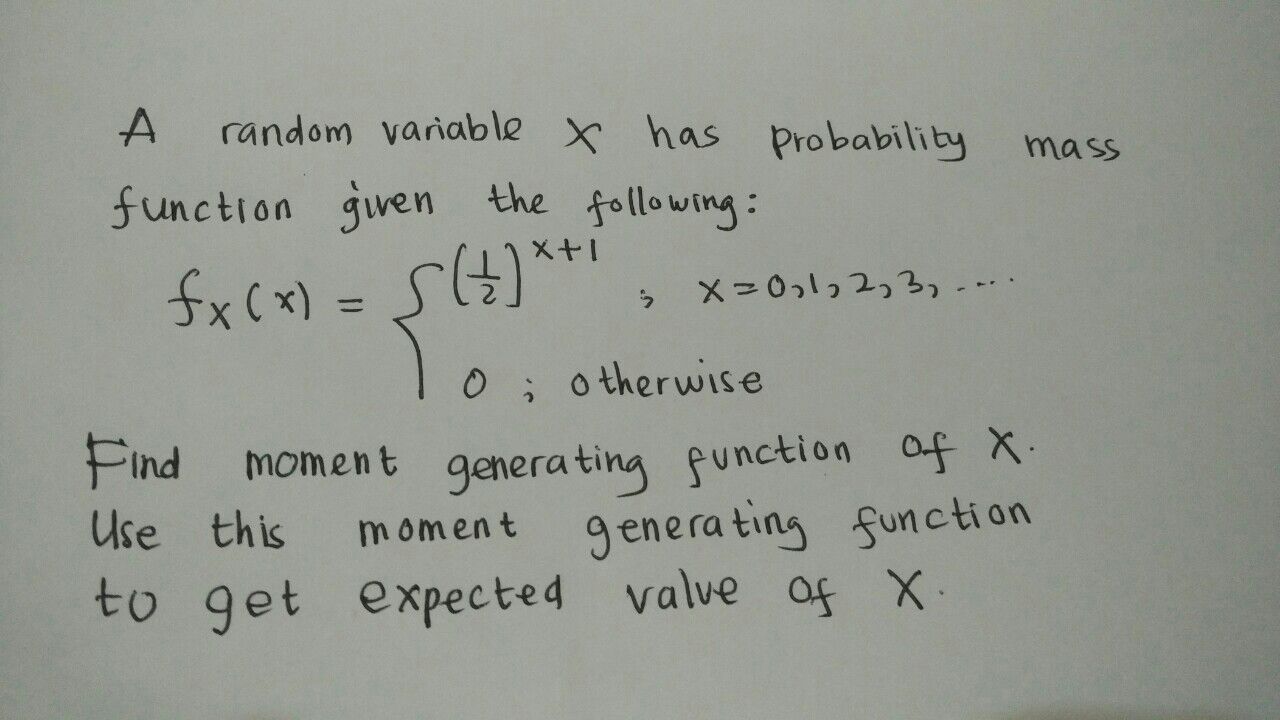Help me to solve about moment generating function please? I will use this for study in preparing my midterm of mathematical statistics because I am still low in this topic. Thank you very much for your help before.

1 Answer
Explanation:
The moment generating function of a random variable
#M_X(t)-=E[e^(tX)]#
when
#M_X(t)=sum_("all "x)e^(tx)f(x)#
For
#M_X(t)=sum_(x=0)^oo e^(tx)(1/2)^(x+1)#
Taking a
#M_X(t)=1/2sum_(x=0)^oo (1/2 e^t)^x#
What's left in the sum is a geometric series which converges to
We now get
#M_X(t)=1/2 [1/(1-1/2 e^t)]#
#color(white)(M_X(t))=1/(2-e^t)#
as our final reduced form of the MGF.
The MGF can be used to find the expected value of
#M'_X(t)=d/dt[(2-e^t)^(–1)]#
#color(white)(M'_X(t))=–(2-e^t)^(–2)(–e^t)#
#color(white)(M'_X(t))=e^t/(2-e^t)^2#
So
#E(X) = M'_X(0)=e^0/(2-e^0)^2#
#color(white)(E(X)=M'_X(0))=1/(2-1)^2#
#color(white)(E(X)=M'_X(0))=1 " "square#
Verify:
Taking the expected value of
#E(X) = sum_(x=0)^oo xf(x)#
#color(white)(E(X)) = sum_(x=0)^oo x(1/2)^(x+1)#
We would first use something like
#sum_(n=0)^oont^n=sum_(n=0)^oot(nt^(n-1))#
#color(white)(sum_(n=0)^oont^n)=sum_(n=0)^ootd/dt t^n#
#color(white)(sum_(n=0)^oont^n)=td/dt sum_(n=0)^oot^n#
#color(white)(sum_(n=0)^oont^n)=td/dt 1/(1-t)#
#color(white)(sum_(n=0)^oont^n)=t/(1-t)^2#
and then apply it with
#E(X) = 1/2sum_(x=0)^oo x(1/2)^x#
#color(white)(E(X)) = 1/2(1/2)/((1-1/2)^2)#
#color(white)(E(X)) = 1/4 [" 1 "/(1/4)]#
#color(white)(E(X)) = 1#

